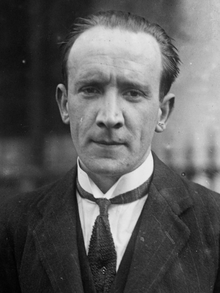
Back كيڤين اوهيجينس ARZ Kevin O’Higgins Welsh Kevin O’Higgins German Kevin O'Higgins Spanish Kevin O'Higgins Basque Kevin O’Higgins Finnish Kevin O'Higgins French Kevin O’Higgins Irish ケヴィン・オイギンス Japanese Kevin O’Higgins NB
Kevin O'Higgins | |
|---|---|
 O'Higgins in 1922 | |
| Vice-President of the Executive Council | |
| In office 6 December 1922 – 10 July 1927 | |
| President | W. T. Cosgrave |
| Preceded by | New office |
| Succeeded by | Ernest Blythe |
| Minister for Justice | |
| In office 30 August 1922 – 10 July 1927 | |
| President | W. T. Cosgrave |
| Preceded by | Eamonn Duggan |
| Succeeded by | W. T. Cosgrave |
| Minister for External Affairs | |
| In office 23 June 1927 – 10 July 1927 | |
| President | W. T. Cosgrave |
| Preceded by | Desmond FitzGerald |
| Succeeded by | W. T. Cosgrave |
| Minister for Economic Affairs | |
| In office 10 January 1922 – 9 September 1922 | |
| President | Michael Collins W. T. Cosgrave |
| Preceded by | Robert Barton |
| Succeeded by | Ernest Blythe |
| Teachta Dála | |
| In office August 1923 – 10 July 1927 | |
| Constituency | Dublin County |
| In office May 1921 – August 1923 | |
| Constituency | Laois-Offaly |
| In office June 1918 – May 1921 | |
| Constituency | Queen's County |
| Personal details | |
| Born | 7 June 1892 Stradbally, County Laois, Ireland |
| Died | 10 July 1927 (aged 35) Booterstown, Dublin, Ireland |
| Manner of death | Assassination |
| Resting place | Glasnevin Cemetery, Dublin, Ireland |
| Political party | Cumann na nGaedheal (1923–1927) |
| Other political affiliations | Sinn Féin (1918–1923) |
| Spouse |
Brigid Cole (m. 1915) |
| Children | 5 |
| Relatives |
|
| Education | |
| Alma mater | University College Dublin |
Kevin Christopher O'Higgins (Irish: Caoimhghín Críostóir Ó hUigín; 7 June 1892 – 10 July 1927) was an Irish politician who served as Vice-President of the Executive Council and Minister for Justice from 1922 to 1927, Minister for External Affairs from June 1927 to July 1927 and Minister for Economic Affairs from January 1922 to September 1922. He served as a Teachta Dála (TD) from 1918 to 1927.[1]
He was part of early nationalist Sinn Féin, before going on to become a prominent member of Cumann na nGaedheal. In his capacity as Minister for Justice, O'Higgins established the Garda Síochána police force. His brother Thomas and nephews Tom and Michael were also elected TDs at various stages.
Along with Arthur Griffith, Michael Collins and Eoin O'Duffy, O'Higgins is an important figure in Irish nationalist historiography, representing a more "conservative revolutionary" position when contrasted with republicanism. After having a role in the Irish War of Independence, he went on to defend the nascent Irish Free State, as part of the pro-Treaty side in the Irish Civil War. During this time he signed the execution orders of seventy-seven prisoners. He was later assassinated in retaliation by an IRA unit in Booterstown, County Dublin.
- ^ "Kevin O'Higgins". Oireachtas Members Database. Archived from the original on 20 April 2019. Retrieved 12 February 2012.
© MMXXIII Rich X Search. We shall prevail. All rights reserved. Rich X Search